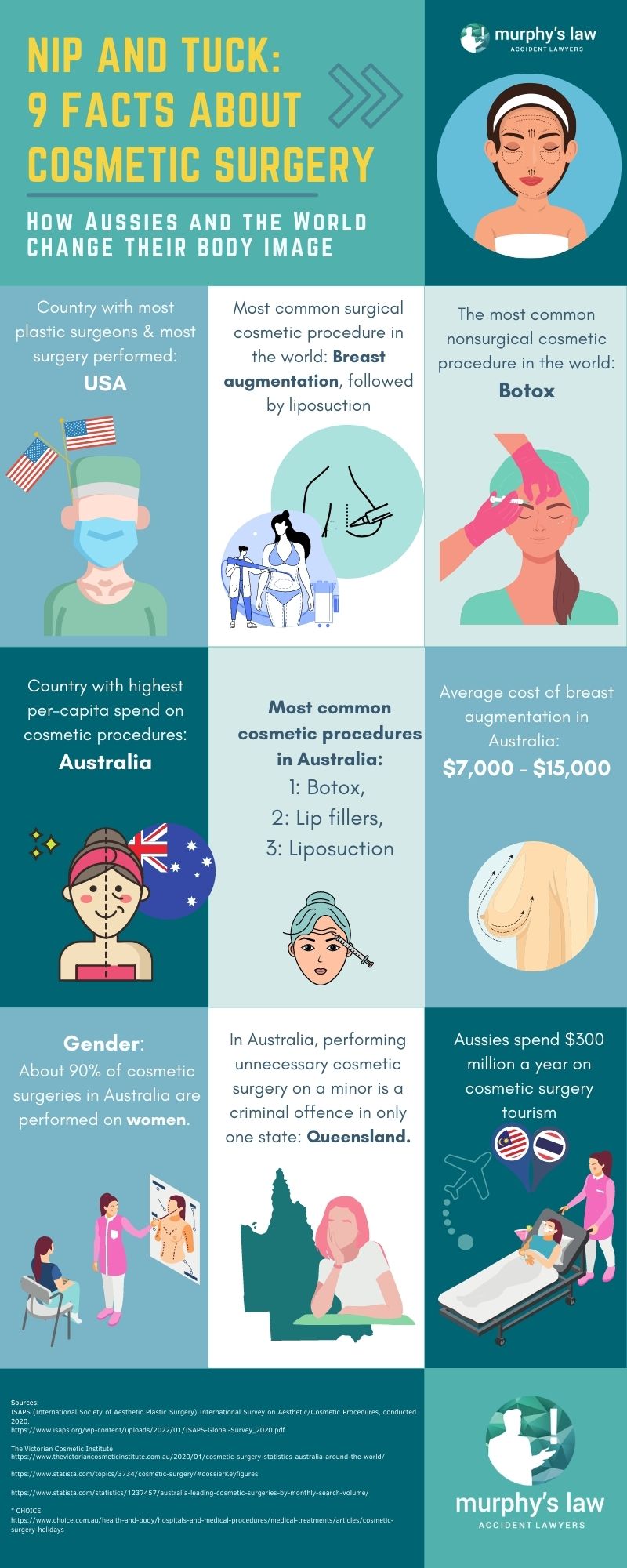Our love affair with aesthetic body enhancement continues to generate big biz. Helping drive growth are social media pressures to look good, increasing acceptance of non-surgical procedures like botox, easier access including tourism clusters, lower costs and new technologies.
Aussies spend more per capita on cosmetic treatments than any other nation – lavishing about one billion collectively on them every year, according to Statistics. In 2018, Australians forked out for 102,404 cosmetic surgery procedures and 100,238 non-surgical ones, according to ISAPS data. Globally, the market is worth an estimated AUD $69 billion and projected to increase to $90 billion by 2028.
More recently, demand for cosmetic procedures has boomed under COVID. A 2020 Australian Financial Review article reporting on the phenomenon attributes the trend to us seeing more of ourselves online under lockdown. Along with wanting to look good on Zoom, spare cash due to canceled travel plans plus the opportunity to recover from surgery at home, has enabled the trend.
However, accompanying this growth is an increase in complications reported by the Australasian Society of Aesthetic Plastic Surgeons (ASAPS).
Buyer beware dud titles
According to Dan Kennedy, president of the Australian Society of Plastic Surgeons (ASPS), the biggest concern for the public is the growth in medical practitioners providing cosmetic surgery without proper surgical training. Far from new, it’s a problem that’s been brewing for the last few decades, Kennedy says.
Fuelling the problem is lack of transparency and clarity around the title ‘cosmetic surgeon’.
Legally, in Australia at the present time, anybody with a basic medical degree can call themselves a ‘cosmetic surgeon’, Kennedy says. “Now, if you're a cosmetic surgeon, you may be a plastic surgeon; you may be an ENT [ear, nose, throat] surgeon; you may be nothing. It's not a meaningful title,” he says. “It could mean someone who is highly trained or somebody who did a weekend course.” In other words, there’s no guarantee the person working on you has appropriate skills for the job.
Kennedy experiences patients in shock after discovering the practitioner that operated on them wasn’t a qualified surgeon. Far from uncommon, research by ASAPS (reported by the Sydney Morning Herald) suggests 81 per cent of Australians are duped (whether deliberately or not) by the title ‘cosmetic surgeon’ mistakenly assuming this always refers to a registered specialist surgeon.
Lack of standardised training and regulation
Those cashing in on the popularity of cosmetic procedures include beauticians, dermatologists and GP’s who undertake courses in specific procedures to expand their skill set and income.
Not everyone practicing cosmetic surgery without a surgeon’s qualification is deliberately deceptive or incompetent for the job, Kennedy says. However, plastic surgeons like Kennedy frequently find themselves called upon to fix shoddy jobs. Media stories also abound about unscrupulous practices in the industry – from deliberately fake plastic surgeons and class actions against dodgy operators to deaths from cosmetic surgery.
Social media aids the problem. Any business can look good and promote itself online without solid qualifications, Kennedy says.
Thanks to legislation in Australia, the title ‘plastic surgeon’ is now confined to those who hold a surgeon’s qualifications and a fellowship with the Royal Australasian College of Surgeons, Kennedy says. Similar to the training all surgeons complete, this involves five years of Australian Medical Council approved post-grad surgery training.
Unfortunately, ongoing lack of meaningful delineation around those practicing cosmetic surgery continues to confuse and disadvantage the public.

Explainer: Who’s who (down under)
Plastic surgery
Surgery performed to remodel, repair or restore the appearance (and sometimes function) of our bodies. It includes both reconstructive and cosmetic surgery (see below).
Plastic surgeon
Surgeons approved in the recognised specialty of plastic surgery and with a fellowship with the Royal Australasian College of Surgeons.
Reconstructive surgery
Surgery performed to restore or repair something that’s broken, lost, malformed or missing and focused on improving bodily function. It includes microsurgery, correction of congenital defects and the treatment of burns. Reconstructive surgery isn’t a specialist title, but a practice of surgeons.
Cosmetic surgery
Surgery performed to alter or reshape a bodily feature with a purely aesthetic or cosmetic purpose to improve appearance, such as breast augmentation and rhinoplasty (nasal reconstruction). Cosmetic surgery is not covered by Medicare.
Cosmetic surgeon
Cosmetic surgeon isn’t a specialist title (as many presume) but a practice that crosses a number of different surgical specialties. In Australia the title is unregulated. Those using it don’t have to be a ‘surgeon’. Anyone with a basic medical degree can use the title.
* In reality, surgeries often combine cosmetic and reconstructive elements.
Why training counts

“It’s not just about being able to ‘cut’ well,” Kennedy says. Beyond the technical skill of the surgeon, there’s a number of potential risks to the public of medicos with insufficient training practicing invasive surgery.
Firstly, the assessment the practitioner makes may not be adequate. “The options they offer might not be comprehensive,” he says.
“You have to have a broad range of surgical experience to be able to say this person needs a neck lift with a muscle division, or this person doesn't need their neck touched, they could have what's called a ‘minimal access’ facelift.”
The practitioner also needs to have the training to recognise when a procedure isn’t appropriate, Kennedy says. “Customisation of surgery, offering of alternatives, depends on having a broad range of options available to the surgeon and understanding the risks and complications of each option. If you're trained in one simple way to do rhinoplasty and you do the same rhinoplasty every time, that one-way cookie cutter approach may not suit all people.”
Qualified surgeons have to master ten competencies. Along with surgical skills, this includes how to document surgery, lead a team and communicate the procedure to patients. The ability to manage post-operative care is particularly important. “The skills that you learn as a surgeon are very important in the management of cosmetic cases, because the same things go wrong in cosmetic cases that go wrong in reconstructive or general surgical cases,” he says. “We want somebody to be able to manage the pain, thrombosis, post operative wound infection, shock and perforations, and all sorts of things that can occur.” Complications can occur even with the best-trained surgeons. It’s important to be in the best hands possible.
Key dangers and risks
Common complications of cosmetic procedures, noted by an article in the Journal of Cutaneous and Aesthetic Surgery, include infection, granulomas (nodules), seroma (fluid buildup under the skin), blindness (from complications to eye surgery), scarring, nerve damage, blood loss, blood clots and other complications arising from anaesthesia.
The risk of complications is higher in procedures performed in salons, spas, and by untrained persons, the authors note.
Data reported by the Sydney Morning Herald suggests up to 20 per cent of women who’ve received breast implants need surgery to correct faulty procedures. While non-surgical treatments are generally safer, they too carry risks.
Know your rights
It’s common for patients who’ve had a bad experience with someone who wasn’t suitably qualified to feel embarrassed and blame themselves, Kennedy says. Despite the existence of legal protections, he says in reality only a tiny percentage of people complain.
Australians have a right of review with the Medical Board and AHPRA, Kennedy says (In Queensland then the Office of the Health Ombudsmen handles most health complaints including those relating to potential medical negligence cases).
Under the law, practitioners must obtain appropriate consent for a procedure, give an adequate cooling off period, explain worthy alternatives, provide adequate printed post-operative information, perform the procedure appropriately with a proper level of skill within a setting appropriate to its complexity, and more.
Calls for reform
As president of ASPS, Kennedy has been lobbying government to change the law around who can call themselves a cosmetic surgeon. This and other patient safety concerns are currently under independent review.
“There has to be a restriction on the use of this titling because it's confusing the public,” Kennedy says. “We've got a failure of the meeting of the minds between government legislation and what the public actually think. What you call yourself is what people believe you are. So it’s a really critical issue.”
He’s also scathing of unprofessional, unethical advertising on platforms like Instagram and Snapchat that commodifies and tries to take advantage of people’s insecurities. “It's basically trying to induce somebody to want something they didn't want before they saw the ad, rather than providing information about a service.”
Those seeking an accredited surgeon can do so through professional associations like the ASPS. The website also helps people navigate understanding the procedure they’re interested in.
“The big picture is the safety of the public,” Kennedy says. “And whilst people can use the term surgeon indiscriminately, we have a problem.”

